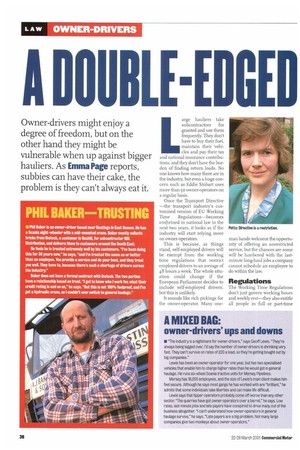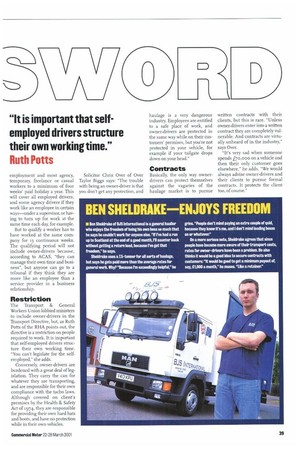Oil LE-E GE
Page 40

Page 41

If you've noticed an error in this article please click here to report it so we can fix it.
Owner-drivers might enjoy a degree of freedom, but on the other hand they might be vulnerable when up against bigger hauliers. As Emma Page reports, subbies can have their cake, the problem is they can't always eat it. Large hauliers take
subcontractors for granted and use them frequently. They don't have to buy their fuel, maintain their vehicles and pay their tax and national insurance contributions, and they don't have the burden of finding return loads. No one knows how many there are in the industry, but even a huge concern such as Eddie Stobart uses more than 50 owner-operators on a regular basis.
Once the Transport Directive —the transport industry's customised version of EU Working Time Regulations—becomes enshrined in national law in the next two years, it looks as if the industry will start relying more on owner-operators.
This is because, as things stand, self-employed drivers will be exempt from the working time regulations that restrict employed drivers to an average of 48 hours a week. The whole situation could change if the European Parliament decides to include self-employed drivers, but this is unlikely.
It sounds like rich pickings for the owner-operator. Many one
man bands welcome the opportunity of offering an unrestricted service, but the chances are some will be lumbered with the lastminute long-haul jobs a company cannot schedule an employee to do within the law.
Regulalions
The Working Time Regulations don't just govern working hours and weekly rest—they also entitle all people in full or part-time employment and most agency, temporary, freelance or casual workers to a minimum of four weeks paid holiday a year. This will cover all employed drivers, and some agency drivers if they work like an employee in certain ways—under a supervisor, or having to turn up for work at the same time each day, for example.
But to qualify a worker has to have worked at the same company for 13 continuous weeks. The qualifying period will not include owner-drivers because, according to ACAS, they can manage their own time and business", but anyone can go to a tribunal if they think they are more like an employee than a service provider in a business relationship.
Restriction
The Transport & General Workers Union lobbied ministers to include owner-drivers in the Transport Directive, but, as Ruth Potts of the RHA points out, the directive is a restriction on people required to work. It is important that self-employed drivers structure their own working time. "You can't legislate for the selfemployed," she adds.
Conversely, owner-drivers are burdened with a great deal of legislation. They carry the can for whatever they are transporting, and are responsible for their own compliance with the tacho laws. Although covered on client's premises by the Health & Safety Act of 1974, they are responsible for providing their own hard hats and boots, and have no protection while in their own vehicles.
Solicitor Chris Over of Over Taylor Biggs says: "The trouble with being an owner-driver is that you don't get any protection, and haulage is a very dangerous industry. Employees are entitled to a safe place of work, and owner-drivers are protected in the same way while on their customers' premises, but you're not protected in your vehicle, for example if your tailgate drops down on your head."
Contracts
Basically, the only way ownerdrivers can protect themselves against the vagaries of the haulage market is to pursue written contracts with their clients, but this is rare. "Unless owner-drivers enter into a written contract they are completely vulnerable. And contracts are virtually unheard of in the industry," says Over.
"It's very sad when someone spends £70,000 on a vehicle and then their only customer goes elsewhere," he adds. "We would always advise owner-drivers and their clients to pursue formal contracts. It protects the client too, of course."
































































































